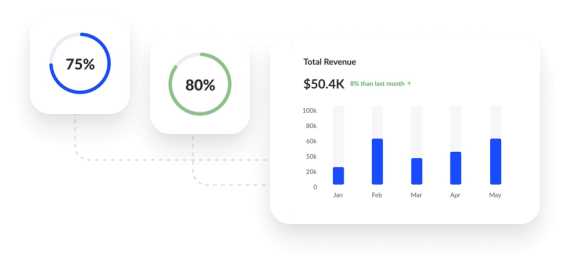










We prioritize effective communication and collaboration to achieve our goals. To facilitate seamless file sharing, we utilize a structured approach that ensures all team members have access to the resources they need. We encourage everyone to upload documents to our shared drive, clearly label files, and set appropriate permissions to maintain data security. Regular updates and notifications about new or revised files help us stay aligned and informed.

Our Exciting Features
Lead Management
CRM systems often include lead management capabilities, which help businesses track and manage potential customers or leads throughout the sales pipeline. This includes capturing leads, assigning them to sales representatives, and tracking their progress.
Contact Management
This feature allows businesses to store and manage customer contact information, such as names, phone numbers, email addresses, and other relevant details. Store all customer contact information in one easily accessible location.
Account Management
Account management in CRM enables businesses to effectively track and analyze customer interactions, preferences, and behavior. It provides organizations a complete view of customers, enabling personalized marketing, sales, and service efforts.
Opportunity Management
CRM systems enable businesses to track and manage sales opportunities, including the associated activities, stages, and probabilities of closing deals. Focus on revenue-generating opportunities.
Sales and Pipeline
CRM systems offer essential tools to manage the sales process and pipeline, enabling deal tracking, performance monitoring, revenue forecasting, and trend analysis. Leads become aware of your product/service.
Customer Support
CRM systems may include customer service and support features, allowing businesses to track and manage customer inquiries, issues, and requests. Includes ticketing and communication tracking features.
Product Management
CRM product management involves the effective handling and organization of products within a CRM system. It streamlines sales, marketing, and customer service processes to maximize productivity and enhance satisfaction.
Feedback Management
A crucial CRM function that involves gathering, analyzing, and acting on customer feedback. Enables businesses to improve satisfaction and elevate overall customer experience.
Order Management
Efficiently handle and track customer orders to streamline fulfillment, enhance satisfaction, and optimize operations. Includes access to purchase history for quick reordering.
Loyalty Management
Build and nurture strong customer relationships through rewards, retention strategies, and personalized engagement that maximizes lifetime value and brand affinity.
Campaign
Launch strategic campaigns that attract, engage, and retain customers. Leverage CRM tools to automate lead generation, segmentation, and personalized messaging to optimize performance.
Template Design
Streamline CRM operations with intuitive, pre-structured templates. Enable consistent communication, data management, and improved team productivity with optimized design workflows.
Sale Invoice
A CRM consolidates customer data, including contact information, purchase history, and payment details. A key CRM component that streamlines processes, boosts productivity, and enhances collaboration.
Task Management
It refers to the process of organizing, assigning, tracking, and managing tasks within a CRM system. A vital CRM component that streamlines processes, boosts productivity, and enhances collaboration.
Chat
Our CRM system empowers staff users with efficient communication capabilities through a robust chat feature. Chat functionality enables seamless one-on-one conversations and group discussions with customers.
Notification
Notifications in a CRM system play a crucial role in keeping users informed about important events, updates, and interactions related to their customers or leads. Stay up to date and respond quickly to CRM activity.
Calendar
A calendar CRM system combines scheduling tools with CRM features— empowering businesses to manage meetings, tasks, and customer appointments in one unified interface.
Reporting and Analytics
CRM systems provide robust reporting and analytics tools to generate insights, visualize data, and track key performance metrics for informed decision-making.
A Unified View
of The Customer
A Unified View of the Customer in CRM enhances personalization, engagement, and decision-making for better relationships.
Industry Leading Procedures
Industry-leading procedures in CRM optimize processes, enhance customer interactions, and drive efficiency and satisfaction.
Collaboration Across All Areas
Collaboration across all areas in CRM fosters teamwork, enhances customer insights, and improves overall service.

Unleash Your Business with our CRM Solutions
Our CRM website is designed to empower your business, offering a suite of powerful tools to boost productivity and customer satisfaction. From streamlined lead management to automated workflows, our CRM solution has got you covered. Embrace the future of business growth and efficiency with our comprehensive CRM platform, tailored to meet your unique needs.Get Started
Team Page Verticals
Tertiary level education
A powerful tool for nurturing relationships with students, alumni, faculty, staff, and other key stakeholders in the educational community.
Adaptive Learning
Adaptive learning CRM platforms utilize various techniques such as artificial intelligence, machine learning algorithms.
Brokerage
This system is a software platform specifically designed for brokerage firms to manage and enhance their interactions with clients and streamline their business processes.
Career School
This system is a software solution designed specifically for career schools or vocational institutions to manage and enhance their interactions with students, alumni, and other stakeholders.
Healthcare
It is a powerful tool that enables healthcare organizations to manage their interactions and relationships with patients, healthcare providers, and other stakeholders.
Lending
This software tool aids financial institutions like banks and credit unions in managing customer relationships and optimizing lending processes efficiently.
Insurance
It is a software tool used by insurance companies to effectively manage their interactions and relationships with customers.
Banking
It is a software solution designed specifically for the banking industry to manage and enhance relationships with customers.
Business
A CRM streamlines customer processes by organizing and automating lead management, contact management, sales tracking, and customer support tasks.
IT
In IT, CRM systems typically consist of software applications that centralize customer-related data, including contact information, purchase history, preferences, and communication logs.
Other
This is a business strategy that focuses on building and maintaining strong relationships with customers. Manage customer interactions from initial contact to post-sales support.